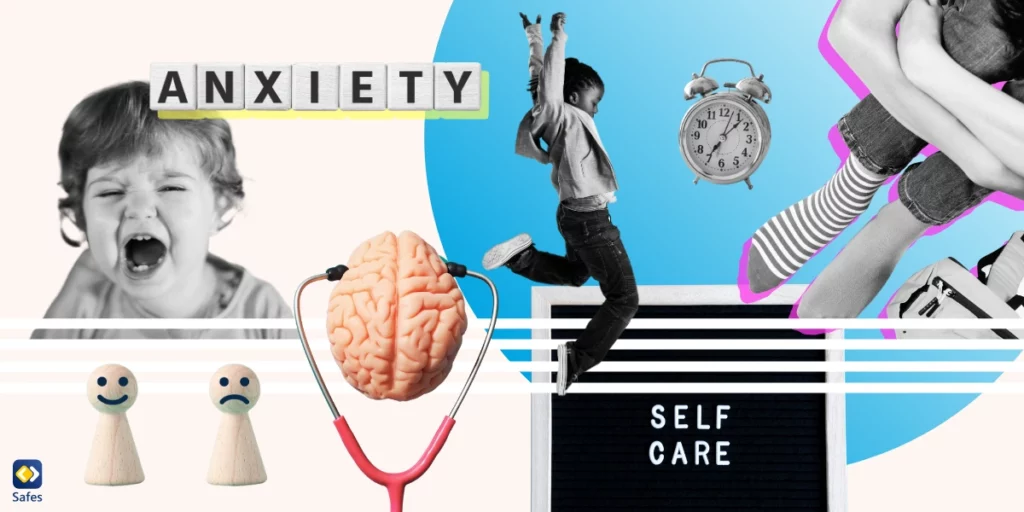Teenagers today face a lot of stress and pressure. From the academic demands of school to the social pressures of friendships, it can be hard for teenagers to cope. As parents, it’s important that we take the time to understand our teens and help them manage their stress. In this blog post, we’ll discuss tips on how to deal with a stressed-out teenager, including talking to them, encouraging healthy habits, connecting with others, and more. With the proper support and guidance, teens can learn to navigate their stress and find healthy ways to cope.
Download and Start Your Free Trial of the Safes Parental Control App
Common Sources of Stress for Teenagers
Common social issues and sources of stress for teenagers that parents need to look out for include:
- Academic Demands: The pressure to get good grades, prepare for college, and meet educational expectations
- Social Pressures: Maintaining relationships with friends, fitting in with peers, and navigating social media
- Family Dynamics: Issues such as divorce, changes in family structure, and conflicts within the family
- Financial Concerns: Dealing with limited resources and affording college
- Physical Changes: Changes in body shape and size, as well as puberty
- Fear of Failure: Fear of not meeting expectations and not reaching goals

Effects of Stress on Teenagers
Stress can have physical and psychological effects on teenagers. Physically, stress can lead to headache, fatigue, stomachache, and difficulty sleeping. Psychologically, stress can lead to irritability, depression, anxiety, and low self-esteem. Stress can also lead to poor academic performance, social isolation, and negative coping strategies such as drinking, drug use, and self-harm. In extreme cases, stress can lead to suicidal thoughts and actions. It’s essential to recognize the signs of stress in teenagers and provide them with the support they need.
How Can Parents Help Their Teenagers Manage Stressful Situations?
Parents can help their teenagers manage stressful situations by listening and providing support, encouraging healthy habits, connecting with others, and promoting help-seeking behaviors. As a parent, you should show your teenager that you’re there to listen to and support them. You should also encourage your teen to get plenty of sleep, eat healthy meals, and exercise regularly. You can also help them stay connected with friends, join a club, or volunteer. Encourage your teen to talk to a trusted adult, such as a teacher or school counselor, or reach out to a mental health professional if their stress seems unmanageable.
It’s crucial for parents to help teenagers identify stressful situations by talking to them, encouraging them to talk about their feelings, and helping them recognize the warning signs of stress. So, you should ask your teenager how they feel and what is on their mind. You should also help them identify their stress triggers, such as academic pressures, social pressures, and family dynamics. Finally, make sure to look out for physical and psychological signs of stress, such as fatigue, irritability, and poor academic performance.
Tips for Parents to Deal with Stress in Their Teens
- Talk to Your Teenager: Show your teen you’re there to listen and support them. Ask how they’re feeling and what’s on their mind. Encourage them to talk openly and honestly without judgment.
- Encourage Healthy Habits: Encourage your teen to get plenty of sleep, eat healthy meals, and exercise regularly. These habits can help reduce stress and boost their mood and energy levels.
- Encourage Positive Thinking: Help them focus on the positive and reframe negative thoughts. Encourage them to practice positive self-talk and remind them of their strengths and successes.
- Connect with Others: Encourage your teen to connect with other teens and supportive adults in their life. Help them stay in touch with friends, join a club or activity, or volunteer.
- Encourage Help-Seeking Behaviors: Remind your teen that it’s ok to ask for help when needed. Encourage them to talk to a trusted adult, such as a teacher or school counsellor, or reach out to a mental health professional if their stress seems unmanageable.
Seek Professional Help
It’s necessary to seek professional help for teenagers when their stress seems unmanageable or when they’re exhibiting signs of depression, anxiety, or other mental health issues. The stress relief tips professionals provide for teens can help them in critical situations. Professional help can also be beneficial if your teenager struggles with addiction, self-harm, or suicidal thoughts. Therefore, it’s essential to recognize the signs of stress in teenagers and provide them with the support they need.
Here’s a list of charities and organizations worldwide that can support your teenager with mental health problems:
- National Alliance on Mental Illness (NAMI)
- Mental Health Innovations (MHI)
- Mental Health America (MHA)
- Rethink Mental Health Incorporated
- National Institute for Mental Health (NIMH)
- Child Mind Institute
- American Foundation for Suicide Prevention (AFSP)
- StrongMinds
- The Jed Foundation (JED)
- Rethink Mental Illness
- Sista Afya Community Mental Wellness
- Brain and Behavior Research Foundation
- Active Minds

How Can Safes Sustain Your Child’s Mental Health?
Sometimes the online world imposes tremendous stress on kids. The internet can cause stress in teenagers in a variety of ways. Social media can be a source of comparison and competition, leading to feelings of anxiety, sadness, and low self-esteem. Cyberbullying can cause feelings of fear, embarrassment, and isolation. Online harassment can lead to feelings of anger and helplessness. Constant access to news and information can cause feelings of stress and overwhelm. Finally, too much screen time can lead to physical symptoms of stress, such as fatigue and headaches.
Parental control apps such as Safes can help a lot in fighting the negative aspects of the internet for children. For example, using the Social Media Monitoring tools of Safes, you can prevent your child from being exposed to dangerous content and people on social media. You’d be notified if your child is sending or receiving messages that can get them into trouble. You can also limit your child’s daily exposure to social media using the Screen Time Monitoring tools.
These are just a few of the many parental control tools that Safes offers. If you’re interested in trying Safes to protect your child from the stress and anxiety that the unmonitored internet can cause, feel free to download it from our website. We offer a 14-day free trial with premium features. Safes is available on both Android and iOS devices.
To learn more about Safes, follow the links below:
- Windows parental controls
- Macbook parental controls
- Parental controls on Android
- iPhone parental controls
Concluding How to Deal with a Stressed-out Teenager
In conclusion, it’s crucial for parents to recognize the signs of stress in their teenagers and provide them with the support they need. Parents should talk to their teenagers and encourage healthy habits such as getting plenty of sleep, eating healthy, connecting with others, and promoting help-seeking behaviors. Plus, tools like the Safes parental control app can help parents monitor their children’s online activity and protect them from the negative aspects of the internet. With proper support, teens can learn to navigate their stress and find healthy ways to cope with it.
Your Child’s Online Safety Starts Here
Every parent today needs a solution to manage screen time and keep their child safe online.
Without the right tools, digital risks and excessive screen time can impact children's well-being. Safes helps parents set healthy boundaries, monitor activity, and protect kids from online dangers—all with an easy-to-use app.
Take control of your child’s digital world. Learn more about Safes or download the app to start your free trial today!




